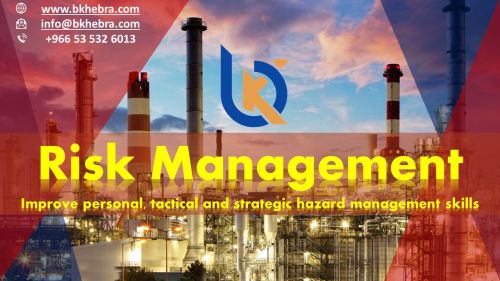| Training Code | Date | Duration | Venue | Fees |
|---|---|---|---|---|
| Keep following, we are updating our training schedules. | ||||

This BK's Risk Management for
Industrial Process Plant, oil & gas & Chemical Plant Programme focuses
on the issues and imperatives in managing risks in the Industrial
Process Plant. Industrial Process Plant, oil & gas & Chemical Plant
are inherently risky, and in order for any organization to succeed in
today’s fast-paced, globally interlinked industry environment, the ability to
proactively identify, assess and reduce risk and uncertainty is essential but
is not always managed effectively. Unfortunately, in recent years, the industry
has seen many high-impact, but avoidable, incidents that, as well as
representing high cost and loss of life have a major impact on reputation. It
is apparent that all responsible organizations today need to give increased
prominence to Risk Reduction and Management.
BK's Knowledge transfer program
(KTP) provides both a structured approach to managing risks efficiently and
effectively and the opportunity to study the management lessons that can be
learned from Oil and Gas, petrochemical, & Chemical industry experiences.
Case studies are used to highlight key issues and learning points.
Providing an in-depth understanding
of the risk management framework from start to finish. Developing a core
understanding of the risk management framework, to embedding risk management
within your organization’s culture, to breaking behavior barriers that prevent
successful implementation, you will finish with the ability to effectively and
resourcefully assess and monitor risks using practical tools.
This B. Khebra’s training course will highlight:
By the end of the course participant will be able to :
This BK's Knowledge transfer program (KTP) is
suitable for a wide range of professionals who are involved in any aspect of
Risk Management within the industrial Process plant, Petrochemical, and Oil
& Gas industries and who want to understand, implement and improve the most
update Risk Management concepts, processes, and ideas. For example:
ORGANISATIONAL IMPACT
Any organization that
takes risk seriously will gain huge benefits from this B. Khebra’s training course. By taking time to
understand the importance of risk management and then backing that up with
recognition of the key processes to be used, your employees will become more
pro-active and avert many issues that become a huge thorn in the side of any
organization.
PERSONAL IMPACT
Participants will gain
key skills and learn many areas of competence around the area of risk
management. Due to the construction of the course, all delegates will gain
hands-on experience with many of the key steps and tools to use and manage risk
well in their own projects or organizations.
COURSE METHODOLOGY:
Participants will
receive thorough training on the subjects covered with the tutor utilizing a
variety of proven adult learning teaching and facilitation techniques. Seminar the methodology is designed around PMI® and RMP syllabi and includes an insight
into appropriate methods as well as industry tools and processes used as a practice example. This course includes teamwork around an applicable case study, with
group discussion and critical analysis of risk in relation to stakeholders,
processes, and project context.
On successful completion of this training course, BK’s Certificate with eligible Continuing Professional Education credits (CPE), will be awarded to the delegates , one CPE credit is granted per 50 minutes of attendance.